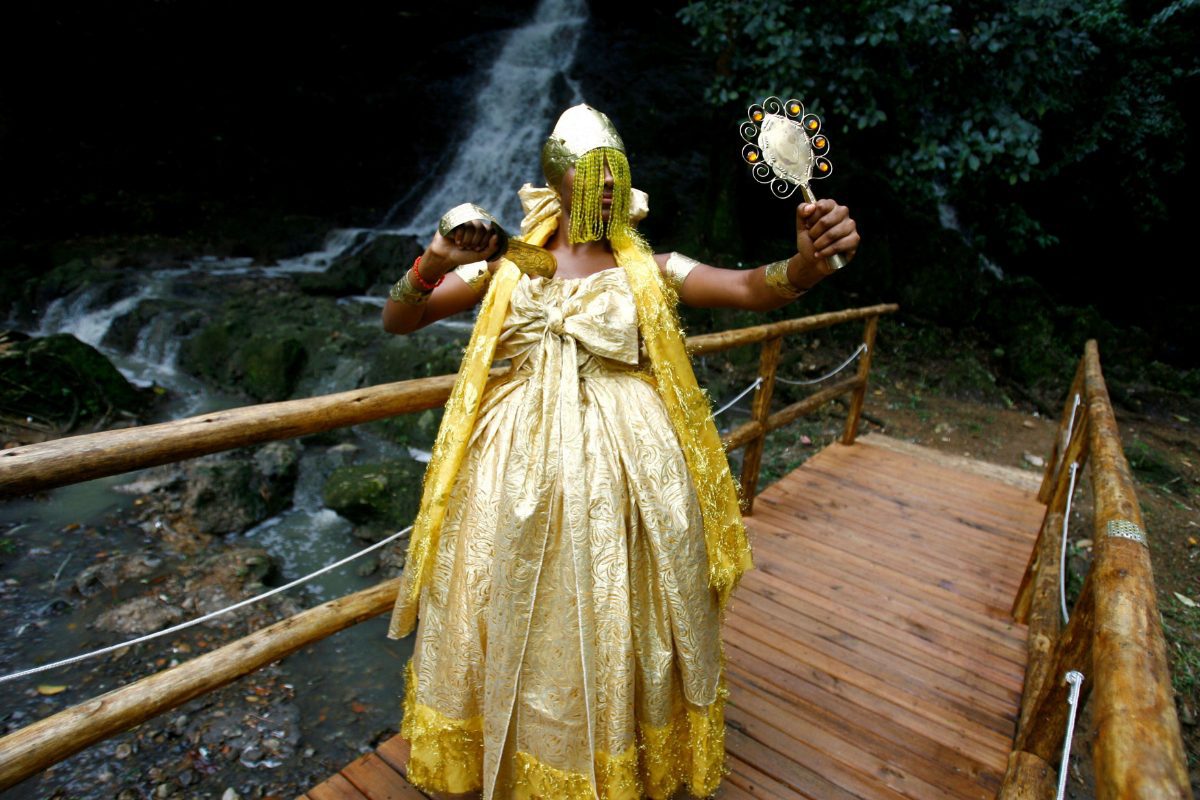I have been spending this month with Ochún. I’ve created a special altar for her, made offerings, meditated, revisited her stories, and researched. She is one of the most complex goddesses in my pantheon, and it has taken me years to understand her lessons and gifts.
We commonly think of Ochún as the orisha of beauty, love, and sexuality. Still, those words are so big, vague, and associated with many goddesses, including Astarte, Inanna/Ishtar, Branwen, Freyja, Aphrodite and Venus, and these goddesses are not interchangeable.
In my work with Aphrodite, I have learned that her most fundamental lesson is self-love. Ochún’s greatest lessons and gifts include self-worth and self-efficacy.
What is self-worth?
Broader and more stable than self-esteem, self-worth comes from knowing and believing in your inherent worth and value. Self-worth doesn’t change according to your success and failures, it is not conditional, and you do not need to earn it. Self-worth is not about what you do; it’s about who you are.
What is self-efficacy?
The Canadian-American psychologist Albert Bandura proposed the concept. He defined self-efficacy as “the belief in one’s capabilities to organize and execute the courses of action required to manage prospective situations.” In other words, self-efficacy refers to your belief in your capacity to succeed, which plays a vital role in how we think, act, feel and approach goals, tasks, and challenges.
For example, a person with a strong sense of self-efficacy views a challenging problem as a task to be mastered and recovers quickly from setbacks and disappointments. A person with a weak sense of self-efficacy avoids challenging tasks because they believe them to be beyond their capabilities; they focus on personal failings and negative outcomes and quickly lose confidence.
To see the connection between Ochún and self-efficacy, we need to look at some of her patakís.
Patakís de Ochún
A patakí is a story with a lesson. Because patakís are oral narratives, they differ, and the ones below may not be exactly like others you hear or read.
Ochún, the vital source of all good things
Olódùmarè, the Supreme Being of the Yoruban pantheon, sent 17 Irunmọlẹ to Earth to make it livable for humans. When they got to Earth, the 16 Odù went about making the world habitable, but they omitted Osun, the seventeenth one; they ignored her. Osun didn’t protest. She remained quiet and went on plaiting her hair.
Everything went wrong. The rain would not fall, epidemics happened, and healing failed. Alas, the 16 Odù failed in their tasks. When they returned to Olódùmarè to lament their failure, the Supreme Being scolded them, “That one you left behind, if you do not bring her here, there will be no solution to your problem. If you continue this way, you will always fail.” The 16 Odù returned to Earth and made peace with Osun.
Ochún, the Messenger of Olódùmarè
The Odù rebelled against Olódùmarè. With the Supreme Being transcendent and distant, they thought they could rule everything on Earth. But Olódùmarè knew, and to punish the Odù, Olódùmarè withdrew the rain.
The Earth became parched, and the people desperate. The Odù tried to reach Olódùmarè and plead for forgiveness and the return of rain, but they could not; Olódùmarè was too far away.
When Ochún, the youngest orisha, offered to reach Olódùmarè, the Odù laughed at her. In the form of a peacock, Ochún flew to Olódùmarè. She tired, and the sun burned her beautiful feathers as she flew higher. Nevertheless, she persisted.
Ochún arrived, bald, her feathers blackened, with the world’s prayers on her hunched back. Olódùmarè was impressed. The rains returned to Earth, and Olódùmarè appointed Ochún as the Creator’s messenger.
Ochún, the sweetness of life
Ogún, the orisha of industry and human effort, withdrew into the forest. As a result, all creation and labour stopped. Tools were not created or repaired, agriculture suffered, and new technologies ceased to appear. Civilisation was endangered, and, one by one, the orisha tried and failed to convince Ogún to return.
Ochún went into the forest with her five golden scarves and a gourd of honey. She found a glade and began to dance, intriguing Ogún and luring him out. He slowly approached her, and when he was close enough, Ochún smeared the honey from her gourd across his lips. Ogún left the forest with her.
Ochún's concealed power
Ochún is known to be the beautiful, sexy, lively, seductive orisha. She is all those things, but we miss so much about her when we reduce her to these qualities.
In these stories, we see Ochún accomplish what no other orisha can–not the elder orisha, not the strongest orisha. She never disrupts, complains, or brags, and she never doubts herself. She waits, plaits her hair, dances, and then does the job nobody else could.
She knows she’s the vital source of all good things on Earth. She knows she can fly high to Olódùmarè and save life on Earth. She knows she can convince Ogún to leave the forest and save civilisation. She knows she is a saviour, and she knows she is renewing. She knows.
Ochún knows who she is and what she can do, and she doesn’t need to prove it to anyone. Her value is intrinsic and not dependent on external validation because only she knows what she is capable of. And her worth, like gold, shines through.

